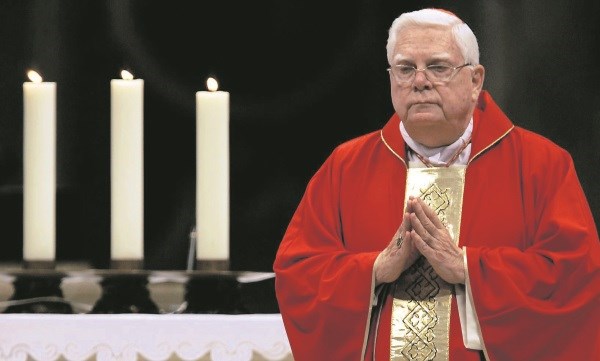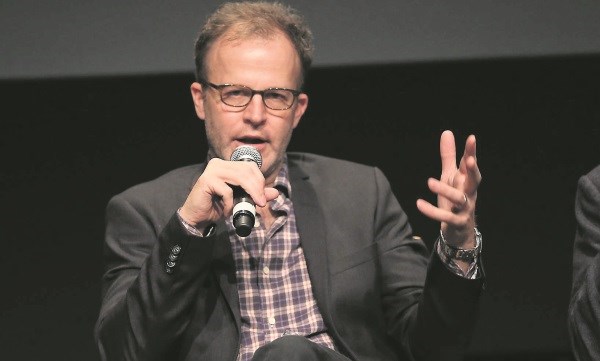Spotlight Film on "Boston Globe's" Clerical Sex Abuse Reveal Is Old-fashioned Journalism at It's Best
Irish Examiner
When Tom McCarthy was studying in Boston College, he occasionally found himself next door to the campus in the residence of the Archbishop of Boston, Cardinal Bernard Law. College life spilled over into the Cardinal’s residence through playing football in the extensive grounds. McCarthy remembers the sense of power that exuded from the bishop’s palace. The young Irish American student from Providence Rhode Island wouldn’t have known it but within two decades he would be back to document the demise of the same cardinal who had appeared to bestride the Boston area and beyond. Now an established name in the Hollywood firmament, McCarthy is the director and co-writer of Spotlight, a movie based on newspaper investigation into the cover-up of clerical sexual abuse which led to the cardinal’s resignation. “Going back to Boston I had to re-educate myself on the city and it gave me a lot of perspective on what it is really like,” McCarthy told the Irish Examiner. “Arguably it is the most Catholic of American cities and the influence of the Irish and Irish America is there for all to see. I really had a sense of that.” Spotlight is the title of the investigative unit in the Boston Globe which began a major investigation in 2001 into the cover-up of clerical sex abuse in Massachusetts. The series of articles produced from the investigation drained the power the Church had enjoyed in the city for centuries. In 2002, Cardinal Law resigned. The stories also pulled a thread that ran right across the states, and even the wider world, as diocese after diocese was forced to come clean. In 2003, the Spotlight team was awarded a Pulitzer Prize for its work. Now the story of that investigation has been brought to the screen. McCarthy, who is well established in the Hollywood firmament, directed and co-wrote the movie. Some are already tipping it to generate interest at the Oscars. With a cast led by the rejuvenated Michael Keaton, and including Mark Ruffalo, there is plenty of scope for acting gongs. The tight writing, which manages to generate and hold tension, is also a notable feature. And Hollywood is a sucker for the wraparound morality of the good guy Davids reaching out to slay the institutional Goliath. The real heroes of the movie are the victims who had not just endured the horrors of childhood abuse, but had their pain sealed behind court documents and public apathy until the Spotlight team came calling. McCarthy was immediately drawn to the story once he was introduced to it by a couple of producers. Having been raised in an Irish American household, Boston and its mores were not unfamiliar to him. “I wasn’t surprised at the power of the Church in the city,” he says. "I was educated by the Jesuits and I had attended Boston College. I was very aware of Cardinal Law while I was at college, and all he represented. "The power they had is somewhat diminished today, but some of that is down to what was uncovered by the Spotlight team.” The movie stays pretty faithful to the original story, with only a minimum amount of artistic licence invoked. It all began in the summer of 2001 when a new editor landed in the Globe. Marty Baron arrived from a big city paper in Florida, the Miami Herald. “The Globe was somewhat insular,” he told the film makers. “They had never had an editor who didn’t’ grow up in Boston.” This departure led to some nervousness among the rank and file. Resources in US newspapers were under serious pressure at the time, a condition that was to persist and accelerate some years later at the dawn of the internet age. Baron was also Jewish, adding to his aura of an outsider. At his first editorial conference he referred to a column that had been penned by respected Globe scribe Eileen McNamara the previous Sunday. As Baron tells it, “She (McNamara) wrote that the truth might never be told about a series of allegations involving sexual abuse by one particular priest. “The Church said one thing and the attorney for the plaintiff said something entirely different. I raised the question as to whether we might get at the truth.” His query was greeted with surprise. There was a tacit acceptance that the Church was not be trifled with in the city. Court documents that had been sealed on the Church’s insistence would not be opened. It was a no-go area.
Now an outsider was pointing out what should have been obvious, particularly to the Spotlight team which had shown itself to be dogged and brave in chasing other major stories. After a slow start, the team reacted in kind. They went after the court documents. They tracked down the victims to record their experiences, both at the hands of abusers and the hands of the legal system through which they had sought redress. It quickly became obvious that the Church had dealt with hundreds of cases by quietly paying the victims without admitting liability. The Spotlight team produced a database of cases, and soon it became apparent that the Church had actually moved abusers to another parish where further cases eventually arose. If all of this sounds familiar to an Irish audience that is because it represents a replicate copy of what happened with the Church in this country. But back in 2001, this stuff had yet to be dragged out into the light. At the time there was a begrudging acceptance that some priests had turned out to be paedophiles. The arguably bigger crime of covering up the abuse, and moving priests on elsewhere to abuse again, had not been exposed. “It says a lot about Boston and the Globe that this is where the story broke,” McCarthy says. “This thing was going on all over the country, all over the world in fact. So you have to give them credit in Boston for embracing the story once it was finally got into print.” The journey to print, the endless hours of footwork, the emotionally exhausting meetings with victims, the opposition from many quarters in the city are handled with considerable skill on the screen.
Also crucial to the portrayal is the simmering tensions and the claustrophobia that is conveyed from the heart of the Spotlight operation, a small office in the Globe building, which has the feel of a bunker. McCarthy took on the project in the knowledge that movies based in newspaper offices have been notoriously difficult. And it was inevitable that Spotlight was going to be stood up against the gold standard in this regard, All The President’s Men. That was the William Goldman scripted movie in which Dustin Hoffman and Robert Redford starred as Bob Woodward and Carl Bernstein, the Washington Post reporters credited with bringing down President Richard Nixon. “I didn’t really see it in that context,” McCarthy says of being measured against the 1970s classic. "All The President’s Men is a great movie, and you know you are standing in the shadow or on the shoulder, but I take on a project on the basis of whether I’m engaged or excited by it and there was plenty here for me.” He was also conscious that he was writing about a trade that has gone through transformative upheaval over the last 15 years. The demise of the newspaper as the central media outlet for the masses got under way within a couple of years of the Spotlight stories. In the US, newspaper resources have been cut to a far greater extent than on this side of the Atlantic. The kind of long form journalism that requires time and space to uncover major stories is now a rare sight in the big American city newspapers. (Although the Globe has bucked the trend in this regard in recent years). “There is a real disconnect with the general public with the current state of journalism and just how dire a situation it is,” McCarthy says. “When we made the movie we were going to champion high-end journalism at a local level and we tried to reconcile could we include in our film the idea of what a loss is this resource that we had. "But we felt that was too editorial so we said we’d just commit to showing by example what high-end investigative journalism could do.” There has in recent days been one bum note about the movie. One of the real life characters portrayed, Jack Dunn, was a trustee of Boston High School. The movie portrays a scene in which he and the school president are visited by two of the Spotlight team. Dunn is portrayed as minimising the damage that may have been done by an abusive priest. He told Globe columnist, Kevin Cullen, who is frequent contributor to Irish media, that his real life reaction was in stark contrast to how he was portrayed in the movie. Dunn said that after attending a screening he went outside and got sick. When Cullen asked McCarthy about this element, he received a response that outlined the depth of research conducted, but added: “The movie is based on real events and uses, by necessity, scenes and dialogue to introduce characters, provide context and articulate broad themes. "That is true of every movie ever made about historical events.” Notwithstanding the irony of licence taken on a subject matter which was about uncovering the truth, that particular row should not impede the movie’s progress. For the greater part, McCarthy managed to recreate the life and times of the investigative unit that did a major public service.
|
.
Any original material on these pages is copyright © BishopAccountability.org 2004. Reproduce freely with attribution.


